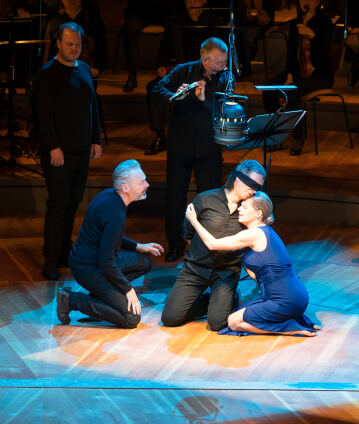Bach’s “St John Passion” with Simon Rattle and Peter Sellars

A double reunion: for the first time since the end of his tenure as chief conductor of the orchestra, Sir Simon Rattle returns to the Berliner Philharmoniker. The programme features one of the most sensational productions of those years: Bach’s St John Passion in the production of Peter Sellars, which uses intensive imagery to accentuate the meditative as well as the dramatic dimensions of the work. The singers include the Rundfunkchor Berlin and a top-class ensemble of soloists.
“When you hear this music for the first time, you are simply not prepared for this surging sea of sound and these dissonances,” says Sir Simon Rattle looking back on his rather late first encounter with Johann Sebastian Bach’s St John Passion. At that time, the conductor was 30 years old and completely overwhelmed by the enthralling, almost modern-sounding music as well as the dramatic power and complexity of the work.
Bach’s passions must also have had an unsettling effect on his contemporaries. Many, for example, were outraged by the theatrical style of the works. “God forbid, children! It is as if one were in the opera house,” as one aristocratic widow is reported to have said. Johann Sebastian Bach had just completed his first year as Thomaskantor when he presented the first version of his St John Passion to the people of Leipzig and took his audience on a disturbing journey into the depths of human existence. It begins with the arrest of Jesus in the garden of Gethsemane and the denial by Peter, who had been his most faithful disciple. It takes us from the interrogation by the Roman governor Pontius Pilate who can find no blame in Jesus, but who nevertheless bows to the demands of the people and allows the man who steadfastly calls himself the Son of God to be crucified, to the place of his death, Golgotha.
“It’s a dirty, disgusting parody of justice,” says director Peter Sellars who, after his sensational production of the St Matthew Passion with Simon Rattle, also presented a staged version of the St John Passion. “There’s a lot of secrecy in this piece, and at the same time that unadorned brutality, as if it were a story from today.” This brutality is particularly evident in the choral scenes in which the aggressive crowd demands the death of Jesus – and at the same time Bach makes this choir, with its contemplative chorales, the haven of peace of the Passion. The narrative of the Evangelist in the form of recitative describes the Passion story of the Gospel of John in an almost reportage style, while the arias reflect moments of personal reflection and subjective perception. Sir Simon Rattle has performed Bach’s masterpiece with the Berliner Philharmoniker on several occasions, most recently in 2014 in Peter Sellars’s production which was performed in Berlin and at the Easter Festival in Baden-Baden. This impressive production is revived this season with the almost same ensemble of singers and the Rundfunkchor Berlin.
© 2019 Berlin Phil Media GmbH
Related interviews
Artists
Our recommendations
- Christian Thielemann conducts Brahms’s “Deutsches Requiem”
- Concert celebrating the 25th Anniversary of the Fall of the Berlin Wall
- Marin Alsop conducts depictions of nature
- Simon Rattle conducts Beethoven and Mendelssohn at the Waldbühne
- Claudio Abbado conducts an “Italian Night” at the Waldbühne
- A Beethoven evening with Nikolaus Harnoncourt